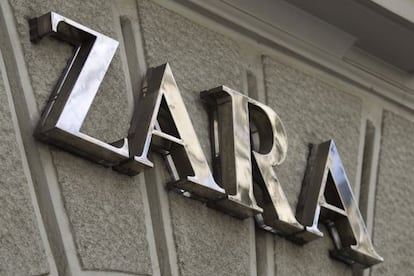Zara owner books record sales and earnings despite euro-zone recession
But the fourth-quarter performance of world’s largest fashion retailer Inditex disappoints

Galicia-based Inditex, the world’s largest fashion retailer, continued to post record sales and earnings in 2012, a year marked by a recession in its main market, the euro zone, but with heavily boosted contributions from China, Russia and the United States allowing the company to book its biggest ever annual profit.
However, the pace of growth in earnings slowed in the last quarter of Inditex’s financial year, which ends on January 31, and this was reflected in a fall in its share price.
Inditex’s sales climbed 16 percent last year to 15.946 billion euros, with two percentage points of the increase coming from favorable exchange rate factors. Like-for-like sales were up six percent. Sales in Spain fell five percent as the country suffered a double-dip recession and as the standard value-added tax rate was hiked by three points to 21 percent last September. Inditex opted to absorb the increase rather than pass it on to its customers.
Revenues were boosted by sales increases of over 30 percent in Asia and the Americas due to new store openings, as well as the success of its online business. As a result, Spain’s contribution to overall sales declined to 21 percent from 25 percent a year earlier, and down from 43.1 percent in 2005. The rest of Europe accounted for 45 percent, while Asia and the Americas were responsible for 20 and 14 percent respectively.
Inditex believes its presence in Spain has reached maximum levels
The company’s gross margin climbed 16 percent to 9.529 billion euros, while gross operating profit in the form of EBITDA was up 20 percent at 3.913 billion euros. Net profit climbed 22 percent to 2.361 billion euros, making Inditex the third most profitable Spanish company last year after telecoms giant Telefónica and energy firm Iberdrola.
However, net income in the final quarter rose by only 12 percent to 705 million euros, Inditex’s slowest pace of growth in the past five quarters. Sales in the period were up 12 percent at 4.58 billion euros, while the gross margin dipped to a two-year low of 57.9 percent of sales. Operating costs grew in line with sales.
“Quarterly earnings were a little bit disappointing,” Bloomberg quoted Anne Critchlow, a London-based analyst at Société Générale, as saying. “Gross margin was the weakest point in these results but the company did a good job in cost control, which rescued the quarter.”
At 4.15pm, Inditex’s share price was down 3.23 percent at 104.95 euros after having fallen by as much as 4.8 percent during the session.
Inditex ended the year with 6,009 outlets in 86 markets after adding 482 new stores, 120 of which were of Zara, its leading brand. Zara accounts for two-thirds of group sales, but only one third of total outlets. The number of stores in Spain fell for the first time, albeit by only two to 1,930. Chairman Pablo Isla said Inditex believes its presence in Spain has reached optimum levels, with no plans for further expansion in its home market.
Inditex opened its first stores last year in Georgia, Bosnia, Ecuador, Armenia and the Former Yugoslav Republic of Macedonia. The biggest expansion was in China, where the number of outlets increased by 121 to 396, making it Inditex’s second biggest market after Spain. The number of outlets in Russia rose from 256 to 331. The expansion increased Inditex’s workforce last year by 10,802 to 120,314.
Inditex plans to increase its dividend per share by 22 percent to 2.20 euros for a total payout of 1.371 billion. The dividend due to Inditex founder, Amancio Ortega, the third-richest man in the world, amounts to 813 million euros, corresponding to his 59.6 percent stake in the company.
Tu suscripción se está usando en otro dispositivo
¿Quieres añadir otro usuario a tu suscripción?
Si continúas leyendo en este dispositivo, no se podrá leer en el otro.
FlechaTu suscripción se está usando en otro dispositivo y solo puedes acceder a EL PAÍS desde un dispositivo a la vez.
Si quieres compartir tu cuenta, cambia tu suscripción a la modalidad Premium, así podrás añadir otro usuario. Cada uno accederá con su propia cuenta de email, lo que os permitirá personalizar vuestra experiencia en EL PAÍS.
¿Tienes una suscripción de empresa? Accede aquí para contratar más cuentas.
En el caso de no saber quién está usando tu cuenta, te recomendamos cambiar tu contraseña aquí.
Si decides continuar compartiendo tu cuenta, este mensaje se mostrará en tu dispositivo y en el de la otra persona que está usando tu cuenta de forma indefinida, afectando a tu experiencia de lectura. Puedes consultar aquí los términos y condiciones de la suscripción digital.









































